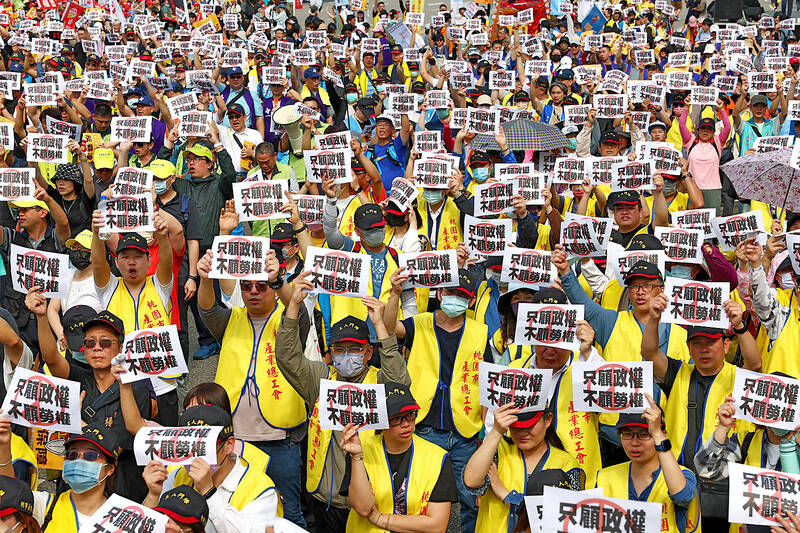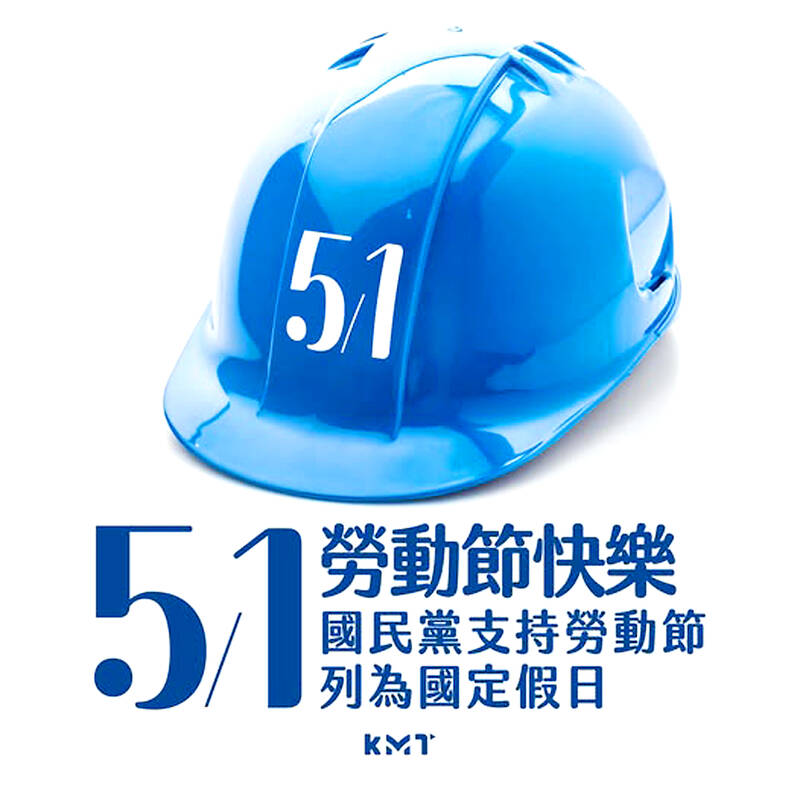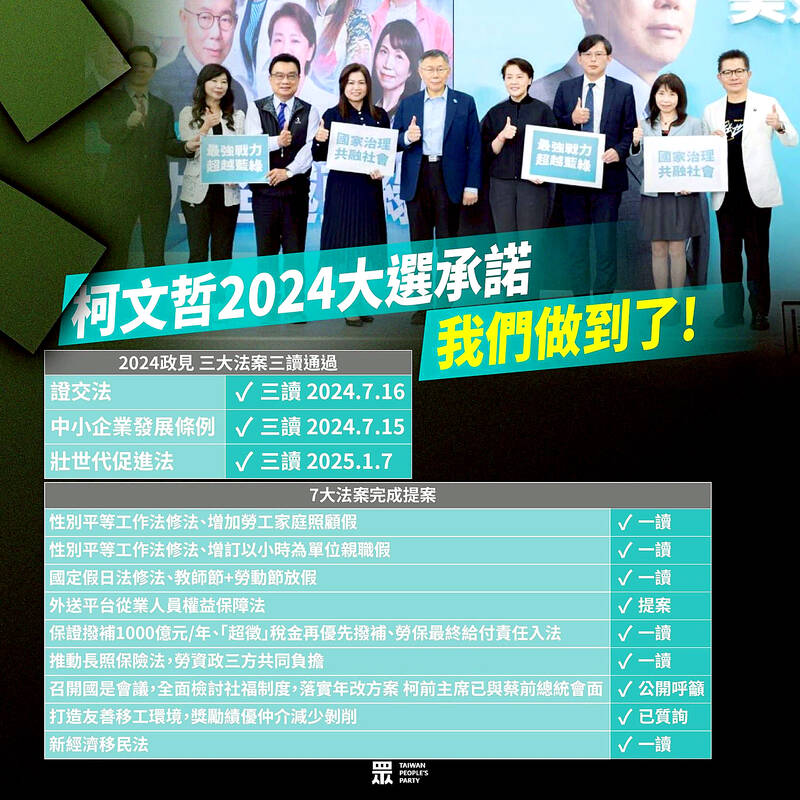Labor groups took to the streets in front of the Presidential Office in Taipei yesterday, calling on President William Lai (賴清德) and his administration to improve working conditions for Taiwanese.
The demonstration was marked by demands for protection against workplace bullying — an issue that drew national attention after a Ministry of Labor staffer died by suicide in November last year, allegedly due to abuse by Hsieh Yi-jung (謝宜容), who headed the New Taipei City office of the Workforce Development Agency from 2023 to last year.
Hsieh was dismissed after receiving two major demerits.

Photo: CNA
In addition to anti-bullying protections, labor groups also called for shorter working hours, higher wages and a more stable labor supply, among other demands.
According to ministry data, Taiwanese workers continue to log the second-highest average annual working hours in Asia, behind only Singapore.
Tai Kuo-jung (戴國榮), president of the Taiwan Confederation of Trade Unions, said labor groups had been making similar demands for years, but the government had yet to respond.

Photo: Screen grab from the KMT’s Facebook page
“It’s no different from bullying workers from all walks of life when the government fails to act on these demands,” he said.
Separately, the Chinese Nationalist Party (KMT) urged the government to reinstate seven former national holidays.
The KMT said that workers have been subject to low salaries, long hours and high pressure, and deprived of the right to rest since the Democratic Progressive Party (DPP) government implemented the “one fixed day off, one flexible rest day off” policy in 2016.

Photo courtesy of the Taiwan People’s Party
Taiwan has only 12 national holidays for workers to rest, while Japan has 16, South Korea has 15 and Hong Kong 17, it said, citing a survey that showed 56.7 percent of Taiwanese supported restoring the seven former national holidays.
The KMT would promote the “memorial day and festival act” to negotiate a reasonable arrangement of national holidays for workers, and safeguard labor safety and dignity via legislation, the party said.
The governing party should respond to popular will and return power to labor to build a worker-friendly Taiwan, it added.
Meanwhile, the Taiwan People’s Party (TPP) yesterday accused Lai of “breaking all the DPP’s promises about labor policies,” adding that it would continue to promote former TPP chairman Ko Wen-je’s (柯文哲) labor proposals.
Lai and former president Tsai Ing-wen (蔡英文) of the DPP have stressed that the DPP cares about workers, but workers’ living quality does not seem to have improved, the TPP said.
The DPP government in 2016 amended the Labor Standards Act (勞動基準法) and canceled seven national holidays in a way that increased work hours, it said.
Taiwan’s time at work has risen to the second-longest in Asia and sixth-longest globally over the past few years, while there are fewer holidays than in Japan, Germany, the UK or France, the TPP said.
Although cross-caucus negotiations on legislation regarding national holidays were held on Wednesday on the eve of Workers’ Day, DPP caucus whip Ker Chien-ming (柯建銘) and caucus secretary-general Rosalia Wu (吳思瑤) were absent, and other DPP lawmakers could not present a proposition, it said.
The TPP has been consistent in promoting Ko’s labor policies by supporting the Securities and Exchange Act (證券交易法) and the Act for Development of Small and Medium Enterprises (中小企業發展條例) to pass the third reading, the party said.
Bills related to Ko’s other promises have entered legislative proceedings, too, including building a migrant-worker friendly environment, establishing family care leave, promoting a long-term care insurance bill, and implementing pension reform, it said.
The TPP would also introduce legislation to increase nurse-to-patient ratios, ensure minimal wages for couriers, and mandate authorities to provide legal and social resources for workplace bullying victims, the party added.

The manufacture of the remaining 28 M1A2T Abrams tanks Taiwan purchased from the US has recently been completed, and they are expected to be delivered within the next one to two months, a source said yesterday. The Ministry of National Defense is arranging cargo ships to transport the tanks to Taiwan as soon as possible, said the source, who is familiar with the matter. The estimated arrival time ranges from late this month to early next month, the source said. The 28 Abrams tanks make up the third and final batch of a total of 108 tanks, valued at about NT$40.5 billion

Two Taiwanese prosecutors were questioned by Chinese security personnel at their hotel during a trip to China’s Henan Province this month, the Mainland Affairs Council (MAC) said yesterday. The officers had personal information on the prosecutors, including “when they were assigned to their posts, their work locations and job titles,” MAC Deputy Minister and spokesman Liang Wen-chieh (梁文傑) said. On top of asking about their agencies and positions, the officers also questioned the prosecutors about the Cross-Strait Joint Crime-Fighting and Judicial Mutual Assistance Agreement, a pact that serves as the framework for Taiwan-China cooperation on combating crime and providing judicial assistance, Liang

A group from the Taiwanese Designers in Australia association yesterday represented Taiwan at the Midsumma Pride March in Melbourne. The march, held in the St. Kilda suburb, is the city’s largest LGBTQIA+ parade and the flagship event of the annual Midsumma Festival. It attracted more than 45,000 spectators who supported the 400 groups and 10,000 marchers that participated this year, the association said. Taiwanese Designers said they organized a team to march for Taiwan this year, joining politicians, government agencies, professionals and community organizations in showing support for LGBTQIA+ people and diverse communities. As the first country in Asia to legalize same-sex

MOTIVES QUESTIONED The PLA considers Xi’s policies toward Taiwan to be driven by personal considerations rather than military assessment, the Epoch Times reports Chinese President Xi Jinping’s (習近平) latest purge of the Chinese People’s Liberation Army (PLA) leadership might have been prompted by the military’s opposition to plans of invading Taiwan, the Epoch Times said. The Chinese military opposes waging war against Taiwan by a large consensus, putting it at odds with Xi’s vision, the Falun Gong-affiliated daily said in a report on Thursday, citing anonymous sources with insight into the PLA’s inner workings. The opposition is not the opinion of a few generals, but a widely shared view among the PLA cadre, the Epoch Times cited them as saying. “Chinese forces know full well that